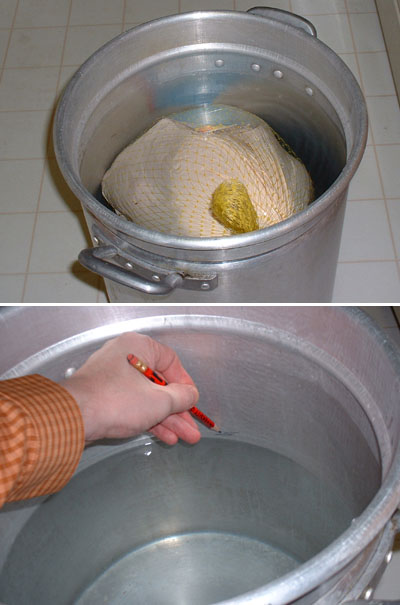Accidents involving turkey frying usually have one of the following three causes: leaving the fryer unattended (which should NEVER be done), trying to use the fryer indoors or beneath a shelter (often made of combustible material like wood, which is sorta like putting Drew Barrymore onboard the
Hindenburg), or having an excess of oil in the pot that you are frying the bird in. And more often than not that last one happens because somebody didn't think twice about filling up the pot with as much oil as was readily available...
without considering the displacement there would be after the bird was lowered in. Put simply: you don't need all that much oil to thoroughly (and safely) fry a bird in. Fortunately, there is a simple trick that you can do to accurately gauge how much peanut (or cottonseed, or in some cases vegetable) oil you'll actually need.
Before doing anything else with your turkey, while it's still wrapped-up in its plastic bag, put it in the bottom of your pot. Then start pouring cold water into the pot (I use a tea jug). Pour enough water in so that you can cover the top of the bird, plus maybe an extra inch more, but not much more (this is to accommodate for the base of the spit that you will have the turkey skewered onto). You should come several inches from the top of the pot. Then remove your turkey from the pot, and give the water a little bit of time to settle. At the water line, take a pencil and draw a dark-enough mark showing the depth of the water minus the bird. Then pour the water out. Here's some pics of me doing this earlier tonight...

You now have an accurate measure of how much oil you'll need to pour into the pot when it comes time to fry, that will allow for the extra mass of the bird when you add it to the cauldron.






0 comments:
Post a Comment